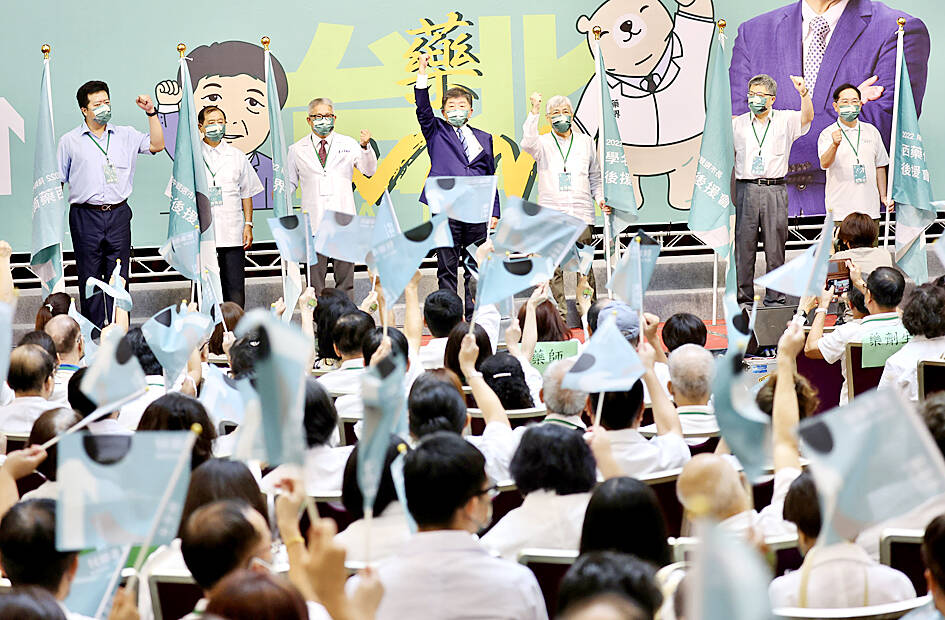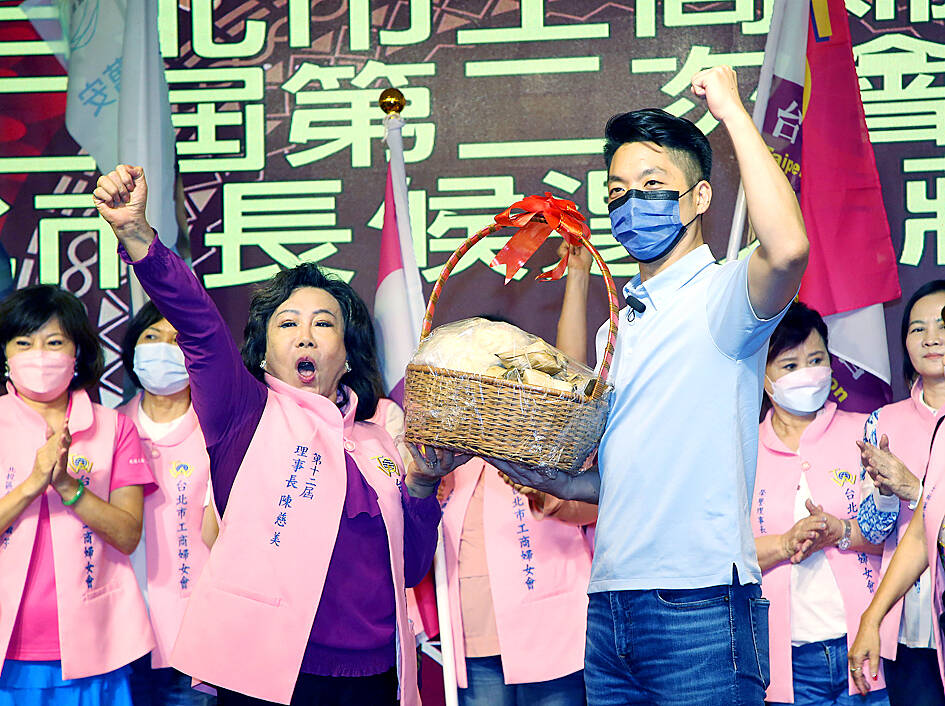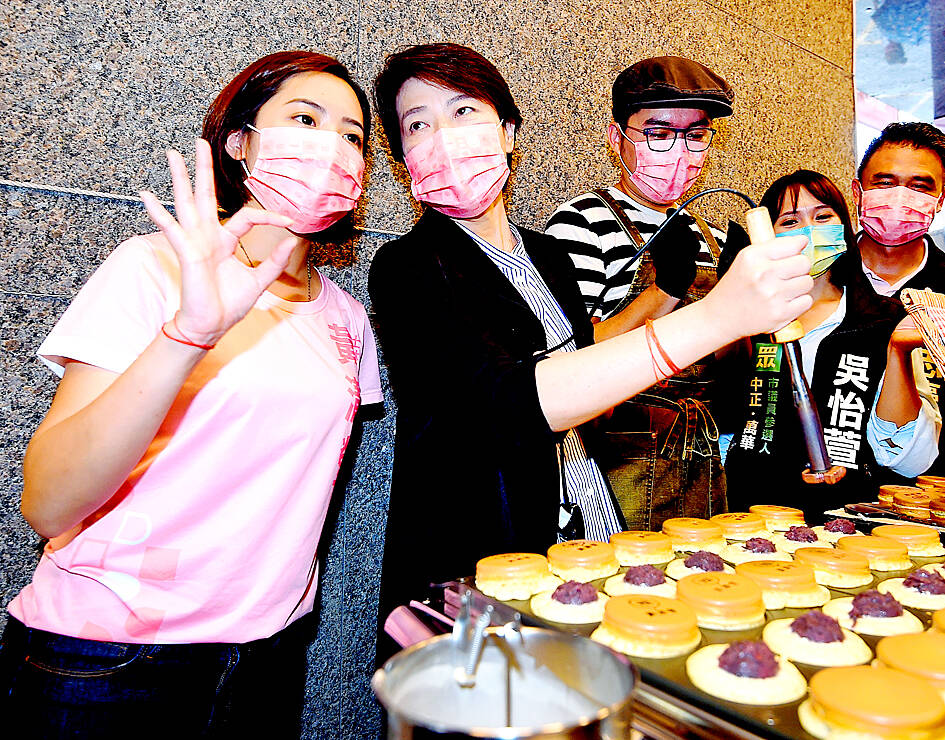More than 30 percent of eligible voters would cast their ballot for Democratic Progressive Party (DPP) Taipei mayoral candidate Chen Shih-chung (陳時中) if the local elections were held tomorrow, compared with 22.92 percent for Chinese Nationalist Party (KMT) candidate Chiang Wan-an (蔣萬安) and 20.52 percent for independent candidate Vivian Huang (黃珊珊), a poll conducted by the Liberty Times (the Taipei Times’ sister paper) showed yesterday.
The poll found that 23.83 percent were undecided, while 2.6 percent refused to answer.
Cross-analysis of the data showed that support for Chen, at 30.13 percent overall, was behind his opponents among voters aged 20 to 49.

Photo: CNA
However, his support rating among voters aged 30 or older was between 13 and 22 percent.
Chiang’s support rating among voters aged 50 to 59 was 25 percent, the highest among all age groups.
Huang was the most popular candidate among voters aged 20 to 29, with a support rating of 33.79 percent.

Photo: CNA
The poll, which was conducted from Wednesday to Saturday, collected 1,072 valid samples from Taipei residents and has a margin of error of 2.99 percentage points.
In related news, the KMT yesterday said that Chen and the DPP should apologize to the public over an “inappropriate” election campaign ad to introduce his proposed policy of installing electronic bidet seats in public restrooms.
In the ad, Chen appears to peek over the partition of a restroom stall down at a man sitting on a toilet, the KMT said.

Photo: Chu Wei-hsiung, Taipei Times
“Peeping is a criminal behavior, not creativity. It should not be encouraged,” KMT Culture and Communications Committee director Hung Meng-kai (洪孟楷) told a news conference.
“However, President Tsai Ing-wen (蔡英文) chose to support and campaign for Chen. This is a president who believes in a candidate who plagiarized his thesis and says nothing about peeping. Are these the core values of the DPP?” Hung said.
KMT Taipei City Councilor Yu Shu-hui (游淑慧) said the Civil Servants Election and Recall Act (公職人員選舉罷免法) should be amended to ban commercials conveying messages of gender discrimination, sexual harassment and invasion of privacy, as they are a bad influence on minors.
“They will look at what Chen has done and ask: ‘Why should we not?’” she said.
“Chen’s campaign has attempted to use farcical ways to drum up media coverage, including making a ‘peeping tom’ film featuring an Internet celebrity. This is an outright abuse of the concept of gender equality,” Yu said.
She also criticized Chen’s campaign pledge to install electronic bidet seats in public restrooms.
“All the plumbing in public restrooms would need to be redone, which would take at least two years. The minimum budget for such a project would be at least NT$500 million [US$16.35 million]. He will also have to negotiate with Taiwan Power Co over the use of electricity,” she said.
DPP spokesperson Lin Chin-yi (林靜儀) said that Chen has apologized for the commercial and uploaded a revised version.
“The plan to install bidet seats in public restrooms aims to elevate the quality of public restrooms, which is an indicator of an advanced city. We hope that our opponent focuses on the policy itself, rather than deliberately highlighting and criticizing some minor details,” she said.

US climber Alex Honnold is to attempt to scale Taipei 101 without a rope and harness in a live Netflix special on Jan. 24, the streaming platform announced on Wednesday. Accounting for the time difference, the two-hour broadcast of Honnold’s climb, called Skyscraper Live, is to air on Jan. 23 in the US, Netflix said in a statement. Honnold, 40, was the first person ever to free solo climb the 900m El Capitan rock formation in Yosemite National Park — a feat that was recorded and later made into the 2018 documentary film Free Solo. Netflix previewed Skyscraper Live in October, after videos

Starting on Jan. 1, YouBike riders must have insurance to use the service, and a six-month trial of NT$5 coupons under certain conditions would be implemented to balance bike shortages, a joint statement from transportation departments across Taipei, New Taipei City and Taoyuan announced yesterday. The rental bike system operator said that coupons would be offered to riders to rent bikes from full stations, for riders who take out an electric-assisted bike from a full station, and for riders who return a bike to an empty station. All riders with YouBike accounts are automatically eligible for the program, and each membership account

NUMBERS IMBALANCE: More than 4 million Taiwanese have visited China this year, while only about half a million Chinese have visited here Beijing has yet to respond to Taiwan’s requests for negotiation over matters related to the recovery of cross-strait tourism, the Tourism Administration said yesterday. Taiwan’s tourism authority issued the statement after Chinese-language daily the China Times reported yesterday that the government’s policy of banning group tours to China does not stop Taiwanese from visiting the country. As of October, more than 4.2 million had traveled to China this year, exceeding last year. Beijing estimated the number of Taiwanese tourists in China could reach 4.5 million this year. By contrast, only 500,000 Chinese tourists are expected in Taiwan, the report said. The report

Temperatures are forecast to drop steadily as a continental cold air mass moves across Taiwan, with some areas also likely to see heavy rainfall, the Central Weather Administration (CWA) said. From today through early tomorrow, a cold air mass would keep temperatures low across central and northern Taiwan, and the eastern half of Taiwan proper, with isolated brief showers forecast along Keelung’s north coast, Taipei and New Taipei City’s mountainous areas and eastern Taiwan, it said. Lows of 11°C to 15°C are forecast in central and northern Taiwan, Yilan County, and the outlying Kinmen and Lienchiang (Matsu) counties, and 14°C to 17°C